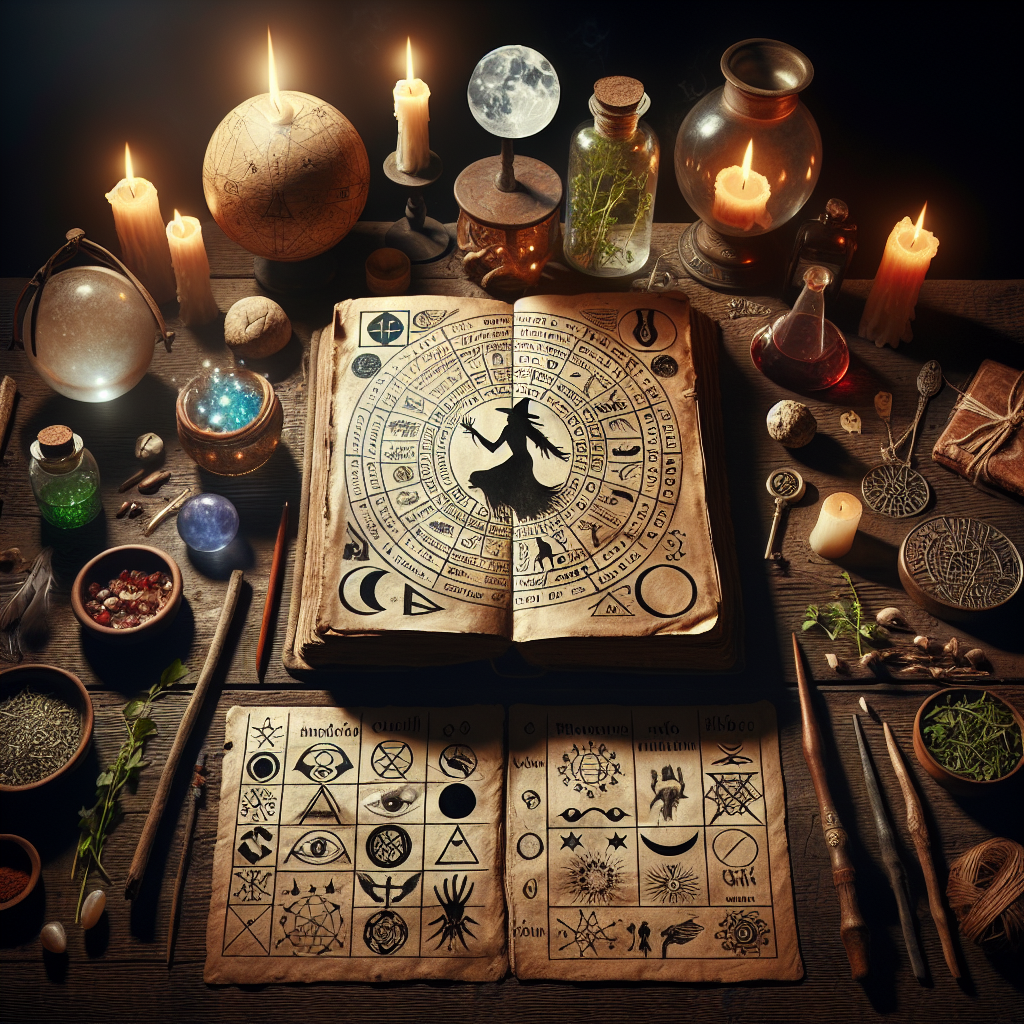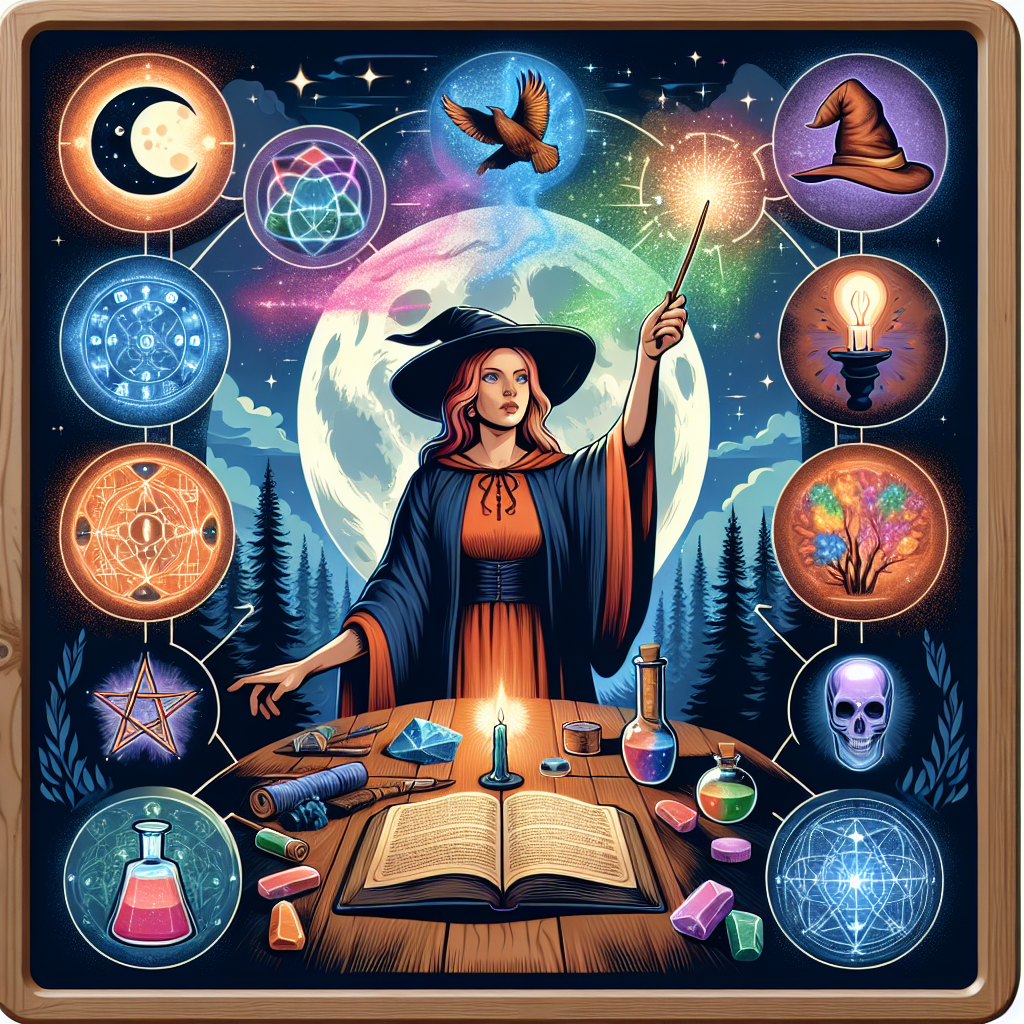As an Amazon Associate I earn from qualifying purchases.

Witchcraft, the practice of magical skills, spells, and abilities, has been part of human culture for thousands of years. From the ancient witch doctors of tribal societies to the modern-day practitioners of Wicca, witchcraft has often been seen as a potent means of influencing the natural world and the human condition. Its efficacy, shrouded in mystery and superstition, continues to fascinate and inspire a diverse range of individuals and cultures.
The belief in the power of witchcraft can be traced back to prehistoric times when early humans sought to control their environment and explain the unexplainable. In many ancient societies, witches were thought to possess the ability to conjure spells, communicate with spirits, and foretell the future. Over the centuries, the perception of witchcraft has morphed, often influenced by religious and cultural shifts. During the European witch hunts, witchcraft was often equated with evil, and its practice was met with severe punishment. However, today, witchcraft is experiencing a renaissance, partially fueled by its portrayal in pop culture and a growing interest in alternative spirituality.
One engaging aspect of witchcraft’s efficacy is its psychological impact. Studies have shown that individuals who believe in the power of their own rituals can experience positive outcomes, a phenomenon often attributed to the placebo effect. When a person believes strongly in the effectiveness of a spell or ritual, their confidence and positive thinking can lead to tangible changes in their behavior, which can then influence the outcome of a situation.
In addition to its psychological effects, the practice of witchcraft often involves a deep connection with nature and the use of natural materials, like herbs and crystals, believed by many to have their own intrinsic power. This connection to the earth and its resources appeals to those seeking a more holistic or environmentally conscious approach to personal power and spirituality.
Furthermore, the community aspect of witchcraft can be a significant source of its perceived effectiveness. For many, engaging in communal rituals and sharing in a belief system with like-minded individuals provides a sense of belonging and emotional support. This camaraderie can lead to a collective energy that reinforces the practices and beliefs of the group, possibly amplifying the effects of their rituals.
Notably, the increase in accessibility to information via the internet has led to a surge in the number of people experimenting with witchcraft. Online communities, blogs, and social media platforms dedicated to the subject allow for the exchange of knowledge and experiences, further embedding witchcraft into modern societal fabric. This shared knowledge base can normalize the practice and its perceived effects, enticing a wider audience to explore its potential.
While the reasons behind witchcraft’s efficacy remain a complex interweaving of psychology, culture, and community, it continues to be a subject of profound curiosity and respect. As societies evolve and seek new ways to understand and influence the world, the study and practice of witchcraft likely will persist, adapting to the changing landscapes of belief and science.
html
How Does Witchcraft Yield Results? Exploring the Power Behind the Practice
Witchcraft, often shrouded in mystery and ancestral wisdom, taps into the realm of spiritual and energy manipulation. To some, it represents a harmonious dance with the forces of nature, harnessing elemental energies, and the user’s intent to manifest tangible outcomes. To others, witchcraft works through the power of belief and psychological impact, where the placebo effect and the practitioner’s focus play a significant role. Regardless of the perspective, the effectiveness of witchcraft may be attributed to a combination of psychological factors, ritualistic focus, and the possibility of tapping into unexplained metaphysical principles. In the forthcoming discussion, we will delve into the intricate details of how witchcraft operates, examining historical beliefs, scientific interpretations, and personal testimonies that aim to shed light on its compelling efficacy.
The question of why witchcraft works is a multifaceted one, with answers that intersect with psychology, sociology, and even neuroscience. To understand the efficacy of witchcraft, one must delve into the realms of belief systems, the placebo effect, and cultural context.
**Belief Systems and the Power of Suggestion**
One of the primary reasons witchcraft can be effective is because of the strong belief systems it is often interwoven with. For many practitioners and clients alike, witchcraft is not mere superstition but a deeply-held belief that encompasses spiritual, religious, and philosophical dimensions. The power of belief cannot be underestimated; it shapes perceptions and can influence physical and emotional manifestations. When an individual believes strongly in a ritual’s power, their cognitive framework can trigger a psychological response that aligns with their expectations.
**The Role of the Placebo Effect**
Closely related to the potency of belief is the placebo effect, an incredible demonstration of the mind’s ability to induce changes in the body. When people undergo witchcraft rituals, they might experience real changes not because of any supernatural force, but because the placebo effect convinces the body that a certain outcome has or will occur. Rituals can trigger the release of natural substances in the body that can produce effects similar to those that medications might elicit.
**Community and Cultural Reinforcement**
Witchcraft often works because it is validated by community and cultural beliefs. When a cultural narrative supports the effectiveness of witchcraft, this reinforces individual beliefs, creating a feedback loop. In many communities, witchcraft is not a fringe activity but a respected and integral part of cultural practice. This cultural reinforcement helps to legitimize the practice and can affect the outcomes that individuals experience from witchcraft.
**Symbolism and the Unconscious Mind**
Another angle from which to understand why witchcraft works is through the lens of symbolism and its interaction with the unconscious mind. Witchcraft rituals often make use of potent symbols that resonate with participants on a deep, sometimes unconscious, level. The symbols and rituals can trigger associations and emotions that tap into the unconscious, influencing behaviors and attitudes in ways that are not fully understood by the conscious mind.
**The Therapeutic Nature of Rituals**
Witchcraft, at its core, often involves highly structured rituals. Rituals in and of themselves can have a therapeutic effect on individuals, providing a sense of control, catharsis, or release. Engaging in rituals can help reduce anxiety and provide a structured environment in which individuals can confront and process complex emotions or life events. The act of performing a ritual can serve as a coping mechanism that helps individuals to deal with uncertainties and challenges in their lives.
**Psychological and Physical Interplay**
The interaction between psychological processes and physical well-being is a well-documented phenomenon. Witchcraft can sometimes work because it influences psychological states, which, in turn, can translate into physical changes. Stress reduction, relaxation, and positive thinking, all of which can be outcomes of witchcraft practices, have been tied to better outcomes in physical health.
**Statistic**
A study on complementary and alternative medicine by the National Health Interview Survey (NHIS) indicates that nearly 33% of adults in the United States used some form of alternative medicine, including practices akin to witchcraft, in the past year. This statistic highlights not only the popularity of such practices but also suggests that a significant number of individuals have found personal efficacy in them, contributing to their continued use.
1. On what principles does witchcraft base its efficacy?
Witchcraft is often said to work based on a combination of psychological effects, spiritual beliefs, and the practitioner’s intention. Many believe that it taps into unseen energies and the power of the mind to influence the material world.
2. Can witchcraft be effective for non-believers?
The effectiveness of witchcraft for non-believers varies. Some argue that witchcraft can work through psychological means, such as the placebo effect, while others suggest that belief is a crucial component for it to manifest any effect.
3. Is there any scientific evidence that supports the workings of witchcraft?
Currently, there is no widely accepted scientific evidence that supports the supernatural aspects of witchcraft. However, some studies investigate the psychological effects of rituals and belief systems related to witchcraft.
4. How do cultural and societal beliefs influence the efficacy of witchcraft?
Cultural and societal beliefs can significantly influence the perceived efficacy of witchcraft. In communities where witchcraft is an integral part of tradition, its effects may be more readily accepted and observed through communal reinforcement and collective belief.
5. Is the placebo effect connected to why some people believe witchcraft works?
Yes, the placebo effect is often cited as a connection to why people believe in the efficacy of witchcraft. Belief in the ritual or the practitioner can trigger a psychological response that creates real, positive outcomes, much like the placebo effect in medicine.
6. Are there any risks associated with believing in or practicing witchcraft?
As with any belief system or practice, there can be risks if it leads to harmful behaviors, dependency, or neglect of medical advice. It’s important for individuals to approach witchcraft with a critical mind and to prioritize their well-being.
7. How does intention play a role in the practice of witchcraft?
Intention is often considered a core component in witchcraft. Practitioners believe that focusing their intention and will during rituals and spells can direct energy to bring about desired outcomes.
8. Can witchcraft be practiced alongside other religious beliefs?
Many people practice witchcraft as a supplement to their religious beliefs, finding that it complements their spirituality. However, compatibility depends on individual beliefs and whether witchcraft practices align with their religious doctrine.
9. Does the environment or setting affect the efficacy of witchcraft?
The environment or setting can be significant in witchcraft, as certain spaces may be considered more conducive to focusing energy and intention. Natural settings or peaceful surroundings can enhance the practitioner’s focus and the potency of their rituals.
10. Can witchcraft have negative consequences if practiced incorrectly?
Practitioners of witchcraft often believe that spells or rituals performed with negative intentions or without proper understanding can lead to unintended consequences. It is commonly advised to practice witchcraft responsibly and ethically to avoid negative outcomes.

Conclusion
Witchcraft’s perceived efficacy can be attributed to a complex interplay of psychological, sociocultural, and physiological factors. At the psychological level, the power of belief and the placebo effect play critical roles; individuals who have faith in witchcraft’s effectiveness may experience real changes and outcomes due to their psychological investment in the practices. Socially and culturally, witchcraft is often embedded within a community’s traditions and value systems, lending it legitimacy and power within that context. The collective belief in witchcraft can reinforce its perceived efficacy, as communal reinforcement and social support systems contribute to the individual experiences of its results.
Physiologically, certain rituals and concoctions used in witchcraft may contain substances with real, albeit sometimes subtle, effects on the body, which can be mistaken for magical outcomes. Furthermore, the rituals of witchcraft often induce altered states of consciousness that can lead to profound personal experiences, interpreted as evidence of witchcraft’s efficacy. In summary, witchcraft works for many due to a dynamic interaction between the mind, body, community, and culture, which together create a powerful experience that confirms the beliefs and expectations of its practitioners and followers. This multifaceted foundation helps to explain the persistence and enduring appeal of witchcraft in various societies across history.
Amazon and the Amazon logo are trademarks of Amazon.com, Inc, or its affiliates.
Continue Your Magical Journey
Free Witchcraft Starter Kit
Get 6 free printable PDFs: grimoire pages, moon calendar, spells, crystals, herbs, and tarot journal.
We respect your privacy. Unsubscribe anytime.
Enhance Your Practice
As an Amazon Associate, I earn from qualifying purchases.

